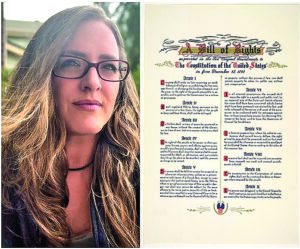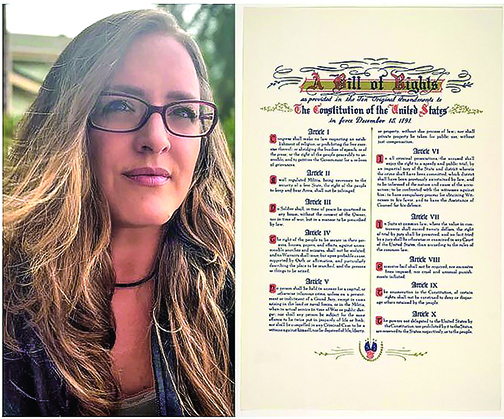 The much-anticipated trial of Tina Peters took place in Mesa County earlier this month. As of press time, the trial is underway. The prosecution has brought various Mesa County employees to testify about the events of May 2021, when the “Trusted Build” took place in the county, as well as about events of August 2021, when the Secretary of State descended upon then Clerk Tina Peters’ office.
The much-anticipated trial of Tina Peters took place in Mesa County earlier this month. As of press time, the trial is underway. The prosecution has brought various Mesa County employees to testify about the events of May 2021, when the “Trusted Build” took place in the county, as well as about events of August 2021, when the Secretary of State descended upon then Clerk Tina Peters’ office.
While the reader will likely know the outcome of the jury trial prior to reading this, it’s still valuable to explore the context of the “The People’s” charges in this case. Like many other Colorado cases, it is a novel legal endeavor and deserves critical examination.
Tina Peters is charged with attempting to influence a public servant, conspiracy to commit criminal impersonation, identity theft, first degree official misconduct, violation of duty and failure to comply with requirements of the Secretary of State, for the actions she took in May 2021 to preserve election records and system log files of Mesa’s 2020 election.
Peters maintains that her actions were part of her official duties, while the state and local authorities claim she broke the law.
Which laws she allegedly broke is a controversial matter.
By the third day of witness examination in the trial, it became clear that the criminal charges against Peters were dubious. Witness after witness admitted that, at best, Peters violated Covid-19 policies and unwritten office standards and practices.
Both the prosecution and the defense established that Peters believed the Trusted Build would wipe election records, and that she took steps to preserve them in accordance with her sworn duties as an elected official.
Further, both the prosecution and the defense established that Peters did not trust the messaging coming out from the Secretary of State about the Trusted Build. As the duly elected official with elections oversight in Mesa County, Peters had a statutory duty to preserve election records for 22 months, federally, and 24 months in Colorado.
This intent is important, particularly because the criminality of the charges against Peters are novel.
The case against Peters comes down to two major factors: (1) Who had statutory authority over elections in Mesa County in May 2021, and (2) Did Tina Peters “steal” the identity of Gerald Wood?
This is where it gets interesting. During the 2022 legislative session, at the behest of Secretary of State Jena Griswold, the General Assembly passed the “Colorado Election Security Act,” or Senate Bill 22-153.
At the time, conservative Representative Ron Hanks said of the legislation, “Every one of my colleagues needs to admit that this piece of legislation effectively nullifies local oversight of elections. County Officials are elected, just like the Secretary of State, but this law subjugates them to her. It removes local governance and control in one of the most important areas of American government — our elections.”
The bill passed, and Secretary Griswold centralized power.
In the Trial of Tina Peters, “The People” attempted to prosecute Peters under this Act, even attempting to mention the law in front of the jury before the judge sustained objections from the Defense.
They passed a law in response to Peters’ actions, and then they tried to prosecute her under the new law. Thus, Tina Peters actions, at the time they happened, were lawful. This fact alone should dismiss all but the “identity theft” charge against Peters.
On the identify theft, Wood, testifying in exchange for immunity, claimed to be an innocent party in the plan to image election machines. But in a dramatic moment during his cross examination, Wood was confronted with messages from Signal, an encrypted messaging app, showing that he was quite cozy with Peters and her team, and ostensibly that he was aware of their plans.
If Wood was aware of the plan, then his identity wasn’t stolen. These messages certainly cast reasonable doubt on Peters’ identity theft charge.
Once again, in Colorado courts, we are left with novel legal efforts to punish the political opposition of the State’s triple political majority —– for otherwise lawful activity.
At the time I write this, the trial is underway. Regardless of how the jury comes down, the evidence is weak, and the expansive actions of state and local officials to pursue such a weak case is concerning.
If it weren’t for the political angles of this case, the matter would likely have resulted in a conversation or, at the very worst, civil penalties. Court is not the place for political disputes, and government officials should know that better than most.
May justice prevail.
Ashe in America is a writer and activist. Find all her work at linktree.com/asheinamerica.

